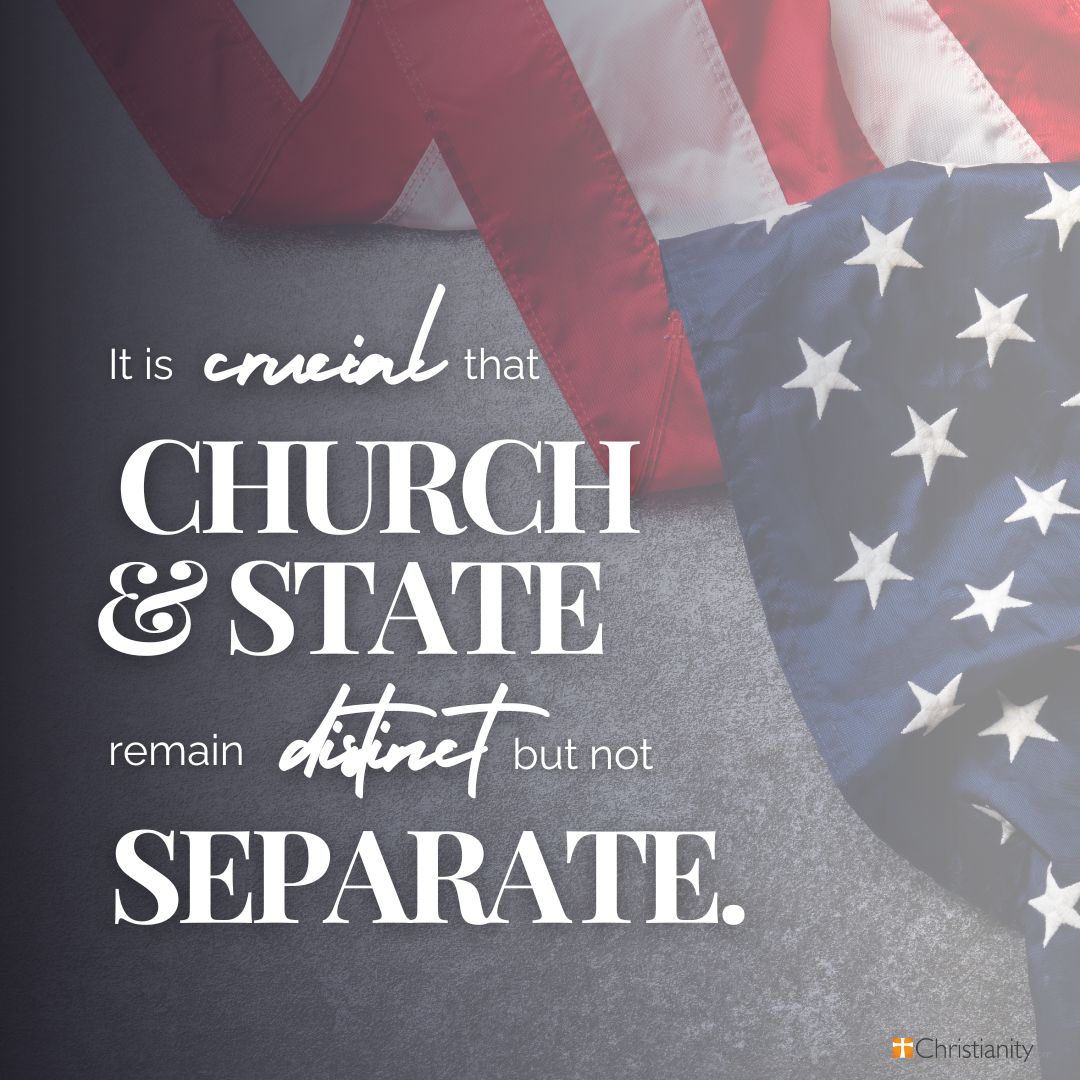At the 2022 Annual Meeting of National Religious Broadcasters (NRB), Pastor Allen Jackson delivered a keynote address dealing with the response of Christians in the midst of a cultural drift away from traditional morals and conservative norms. Jackson noted transgender athletes, gay marriage, abortion, COVID mandates, and a variety of other socio-political oddities as evidence of the erosion of truth in American society. He encouraged Christians to be active in evangelism and speaking the truth. Unbelievers need to know Christ.
Yet, at some point, Jackson moves from the apolitical witness of the church to a conversation about the United States and the preservation of a particular heritage. For instance, Jackson notes:
“We’ve done that [practiced a policy of appeasement]. They took prayer out of the schools, and we nodded: ‘’Well, we’ll pray somewhere else.’ They took the commandments out of the schools, and we nodded, and we said, ‘We can say the commandments someplace else.’ They redefined marriage and put a rainbow on the White House…and we shrugged our shoulders and said, ‘Well, we can still practice our faith the way we want to….Folks, the heritage of this nation is of a Christian worldview. It didn’t demand that you be a Christ follower. We’ve always been a melting pot with people from many faiths and many backgrounds, but the values that have bound us together as a people have always come from a Judeo-Christian worldview, and if we sacrifice that, we will lose our freedoms, our liberties, and our opportunities. Our children will not know the things that have defined our lives.”
I have no desire to defame Jackson. He is a talented preacher and strong biblical teacher. In this instance, however, the perspective he advances is lacking in theological nuance. In particular,r Jackson (1) collapses Christian conviction with a national Christian (or Judeo-Christian) worldview, (2) suggests a connection between Christianity and political freedom, and (3) elevates the rights we have in the United States to a definitional status.
Why does one keynote address from 2022 matter? It matters because it is representative of a perspective that has become somewhat normative in certain Christian circles. As I discuss at greater length in Serpents and Doves: Christians, Politics, and the Art of Bearing Witness, collapsing the distinction between the church and American civil religion (ACR) has become rather common. Maintaining the distinction is crucial because Christians are not called to embody or even preserve America’s heritage unless doing so emerges from discipleship.
Collapsing Christian Conviction with a National Christian Worldview
Jackson and others seem willing to describe the worldview of the United States as “Christian” or “Judeo-Christian,” even though Christ and, thus, the Triune God are not essential to it. As I note elsewhere, “When the nation or conservative values or institutions that have decoupled themselves from or marginalized Christ are described as ‘Christian,’ we empty ‘Christian’ of appropriate nuance.” Without a recognition of Christ, no worldview—regardless of how moral or wholesome—should be described as “Christian.”
You may be thinking that this argument is relatively trivial since it only involves language. Consider, however, the difference between describing yourself as “blessed” versus describing yourself as “lucky.” The former is a theological assertion—God has provided you with the good things you have in your life. The latter is ambiguous—it suggests that the good things you have in your life have not been given to you with any intentionality. “Luck” dismisses God’s active presence in our lives and robs him of agency and glory. Words matter.
Instead of asserting that the United States was founded on a “Christian worldview” (or even a “Judeo-Christian worldview), it would be more accurate to say that the United States drew inspiration from the Christian tradition. Our nation does not recognize the authority of Jesus Christ, even if it recognizes the wisdom of select aspects of Christ’s instruction. As I suggest in Serpents and Doves, “Using the Bible as an inspiration is far different than recognizing the Bible as inspired.” The former denies the Bible’s authority by selecting those portions of it that serve one agenda or another. The latter recognizes the Bible as God’s disclosure and seeks to allow the scriptures to govern both life and faith. Distinguishing between these perspectives is not simply semantic, but is crucial to maintaining any meaningful substance of the Christian faith.

Political Versus Theological Liberty
On July 4th, Americans celebrate our independence from Great Britain. For citizens of the United States, freedom—particularly political freedom—is central to our national narrative. Being free politically is indeed a blessing, yet we must keep two ideas in mind: (1) political freedom is not theological freedom, and (2) political freedom is not necessary for theological freedom.
First, there are many Christians who are free in Christ but living under a political regime that curtails all sorts of liberties. One of my friends, for instance, grew up in communist Romania as a Christian. He was free in Christ, but restricted in his political freedom. Christians, regardless of the political freedoms they lack or enjoy are always free to serve Christ.
Second, in 1 Corinthians 7, Paul encourages Christians to remain as they were when Christ called them. If they are uncircumcised, they should not feel the necessity to become circumcised (7:18). Paul’s point is not that Christians should not change, but that they do not need to change to serve Christ. This comes out in his instruction to bondservants who are not to be concerned about their position but should not ignore opportunities to gain their freedom (7:20). The bondservant may not have freedom in the sense that they are not under an earthly master, but that does not mean that a bondservant cannot serve the Lord (7:22). In fact, the manner in which one conducts oneself as a bondservant is crucial to representing Christ well (1 Tim 6:1; Eph 6:5-8; Col 3:22-25; Tit 2:9-10).
The freedom we celebrate on July 4th is neither trivial nor ultimate. We should be grateful for and enjoy the freedoms God has provided to us via the governing authorities he has established (Rom 6:1-4). We do that, in part, by ensuring that our political freedom does not diminish our service to Christ. As Christians, we are not free to do whatever we want. We are freed for obedience and free to obey all Christ commanded, having been liberated from the oppressive rule of sin (Rom 6:15-22).
Lives Defined by Christ
Jackson seems to suggest that if we lose “our freedoms and our liberties and our opportunities,” “our children will not know the things that have defined our lives.” Is that the case? If so, Christians in the United States may need to rethink how central our freedoms, liberties, and opportunities have become to who we are. Political freedoms are certainly part of the experience of Christians in America, but they do not define our lives. Christian lives are to be defined by discipleship. We work out that discipleship in a variety of contexts and situations that may change the way that discipleship looks, but never so much that it is not intelligible as discipleship.
When we mistake political freedom for theological freedom, we can easily become servants of a political system in service to ourselves. When we exercise theological freedom—the freedom to observe all Christ has commanded (Matt 28:20)—we don’t necessarily surrender our political freedoms (Acts 16:37-38; 21:39; 22:25-29; 23:27). Instead, we recognize that there may be a time when surrendering our rights may serve the gospel (1 Cor 9:1-). To do so, we cannot make a fetish of our freedoms. They must be taken up or set aside as our commitment to follow Christ dictates. Our rights cannot define our lives.
It is crucial that church and state remain distinct, but not separate. Christians who refuse to bear witness to Jesus Christ have forgotten the core mission of the church: to make disciples. Confusing church and state or political freedom and theological freedom diminishes Christian witness and elevates our national affiliation to an improper place.
We are right to celebrate our freedoms, but we are wrong if we do not acknowledge God as the source of those freedoms. We are wrong if we do not see our freedoms as gifts given to advance the gospel and build the Kingdom of God. We are called to make disciples regardless of our political situation. Losing our political freedoms may not be desirable; however, our primary concern is not to protect our freedoms, but to bear witness to Jesus Christ. Any political action we take must emerge from discipleship so that God’s people do not become political lobbyists seeking to preserve a particular lifestyle but women and men with an unwavering commitment to living under the authority of Jesus Christ.
Photo Credit: ©Unsplash/Jonas Von Werne





.jpg)